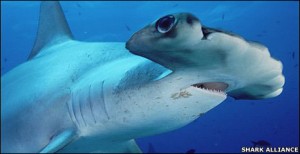
 Palau’s new shark sanctuary covers 600,000 square kilometers of almost all open ocean, making patrolling for outlaws a bit like searching for a needle in a haystack. In addition, Palau is attempting to make its new sanctuary a model for marine conservation for other small island nations, many of which are more water than land. So the eyes of the Pacific, if not the world, are on Palau to set a model. And they’re going to need help – but the big question is from whom?
Palau’s new shark sanctuary covers 600,000 square kilometers of almost all open ocean, making patrolling for outlaws a bit like searching for a needle in a haystack. In addition, Palau is attempting to make its new sanctuary a model for marine conservation for other small island nations, many of which are more water than land. So the eyes of the Pacific, if not the world, are on Palau to set a model. And they’re going to need help – but the big question is from whom?
“President Johnson Toribiong has led the world in taking action to protect sharks, and his establishment of a shark and marine mammal sanctuary is a call to action for other nations to defend diminishing populations of marine species. Sea Shepherd Conservation Society is honored to be working with President Toribiong and Palau’s Council of Chiefs, and we are proud to be a part of protecting the incredibly beautiful and biologically important islands of the Republic of Palau,” said Captain Watson in Sea Shepherd’s press release.
According to that press release, the primary goals of the agreement are:
- “Sea Shepherd will—at its sole expense—send a vessel to patrol Palau’s territorial waters against illegal fishing activity.
- Sea Shepherd will assist the DMLE officers onboard its vessel and facilitate prosecution of offenders to the fullest extent.
- The relationship between Sea Shepherd and Palau is defined as a “partnership in the preservation of marine life.””
Despite the general world reaction of surprise at the arrangement, Sea Shepherd also claims to have a similar 11-year relationship with Galapagos National Park and the Ecuadorian Environmental Police.
Since the arrangement was signed, Japan has since stepped up, offering ships and personnel to patrol the waters of Palau’s marine sanctuary. According to Shark Defenders, the Japanese delegation described Sea Shepherd as terrorists in promoting alternative affiliations. President Toribiong withdrew the memorandum of understanding stating the need to find diplomatic solutions. The Nippon Foundation describes these diplomatic needs as relations between the US, Australia, and Japan.
On their website, however, Sea Shepherd “welcomes the news”, and has moved on, offering the Sea Shepherd protection to other island nations should they choose to follow in Palau’s sanctuary-creating footsteps. The Federated States of Micronesia and the Republic of the Marshall Islands might be next. Or Sea Shepherd might now use their boats with new free time to fight in more contentious regions such as Libya as part of bluefin tuna conservation efforts.
Sea Shepherd’s apparent willingness to participate within existing legal and conservation frameworks comes as a surprise to many, given their history of commitment to direct action. Some in the direct action mindset would consider agreements to work with Palauan police for shark patrols outside the mission of the Sea Shepherd Conservation Society, tying up the boats while they could be fighting direct battles. Efforts in Libya might satisfy the desire for direct action, as evidenced by preparations of bulletproof vests on board the Sea Shepherd boats as they leave from France for tuna fishing waters. We’ll see where Sea Shepherd decides to head next.
I am from Palau and have a good friend and business associate from chuuk state of the FSM. The friend owns and runs a hotel in the capital and a resort island in the lagoon of Chuuk state. We were discussing your great efforts in Palau to protect sharks and other sea mammals in the nation’s EEZ. He is wondering if your services extend to the FSM, especially his island state of Chuuk.